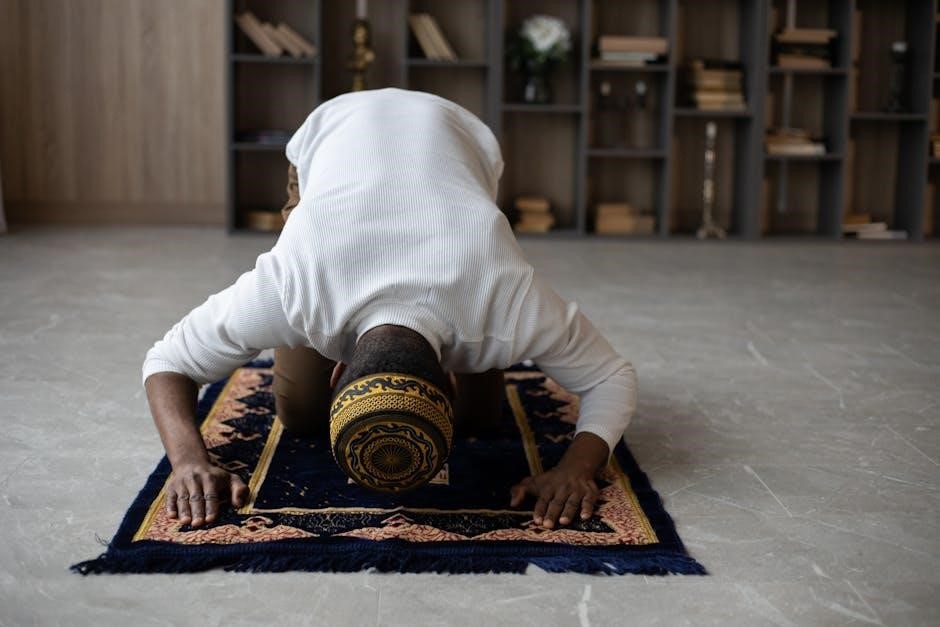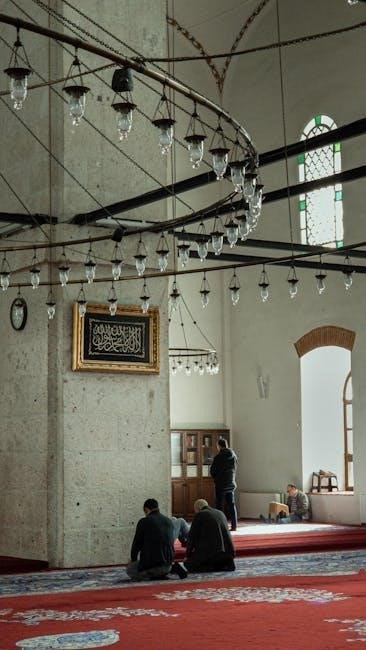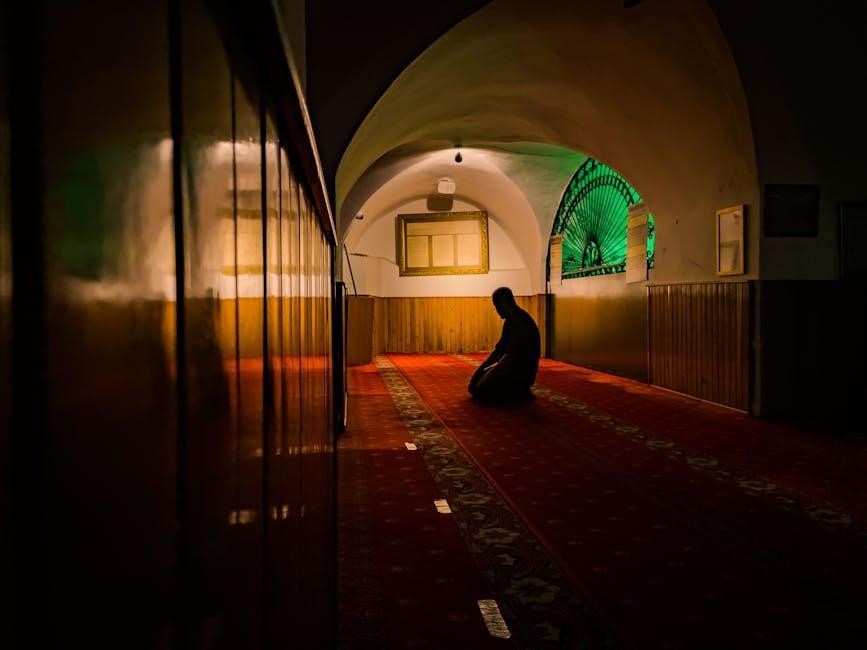Dua after Namaz is a profound method of connecting with Allah‚ seeking forgiveness‚ and enhancing spiritual growth. This guide provides authentic supplications and their significance‚ available in PDF formats for easy access and recitation.
Significance of Dua After Salah
Dua after Salah holds immense spiritual significance‚ serving as a direct means of communication with Allah. It strengthens one’s connection‚ fostering humility and gratitude. Reciting authentic supplications‚ as guided by the Prophet (SAW) and his companions‚ ensures a deeper bond with the Almighty. These prayers‚ often sourced from the Quran and Hadith‚ are a Sunnah practice‚ emphasizing their importance in daily worship.
The PDF resources highlight that post-Salah supplications are not just requests but expressions of thankfulness and seeking forgiveness. They provide a structured way to reflect on one’s actions and seek spiritual purification‚ making them essential for personal growth and inner peace.
Overview of Dua After Namaz PDF Resources
Dua After Namaz PDF resources offer a comprehensive collection of authentic supplications recommended after each obligatory prayer. These documents‚ sourced from reputable references like Sahih al-Bukhari and Sahih Muslim‚ provide clear instructions on which duas to recite‚ their translations‚ and proper recitation guidelines. Many PDFs include transliterations for easier recitation‚ along with benefits and historical context. They serve as invaluable guides for believers seeking to deepen their spiritual practice and connect with Allah through meaningful supplications. These resources are widely available online and formatted for easy access‚ making them indispensable for daily worship.

Importance of Dua After Salah
Dua after Salah holds great significance in Islam‚ serving as a means to connect with Allah and seek His mercy. Regular recitation strengthens faith and is a recommended Sunnah‚ as practiced by the Prophet (PBUH) and his companions.

Connecting with Allah Through Supplication
Dua after Salah is a powerful method of direct communication with Allah‚ fostering a deep spiritual connection. It allows believers to express gratitude‚ seek forgiveness‚ and present their needs. Sincerity is key‚ making the supplication a heartfelt dialogue with the Creator. Regularly practicing Dua after each prayer strengthens faith and aligns one’s intentions with Allah’s will. This act‚ rooted in the Sunnah‚ is highly recommended and supported by authentic Hadiths‚ ensuring its efficacy. By incorporating Dua into daily worship‚ individuals can cultivate a closer relationship with Allah‚ seeking guidance‚ mercy‚ and spiritual fulfillment.
Seeking Forgiveness and Spiritual Growth
Dua after Salah is a powerful means of seeking forgiveness and fostering spiritual growth. Regular recitation of supplications helps believers reflect on their actions‚ express remorse‚ and seek Allah’s mercy. The Prophet (ﷺ) emphasized the importance of supplication after obligatory prayers‚ as it is a time when prayers are more likely to be accepted. Specific duas‚ such as the Tasbeeh of Lady Fatimah (a.s.) and other recommended supplications‚ are effective in purifying the heart and strengthening one’s spiritual connection. Consistent practice of these supplications leads to inner peace‚ self-refinement‚ and a deeper relationship with Allah.
Recommended Dua After Each Prayer
Authentic supplications are recommended after each prayer‚ including Fajr‚ Zuhr‚ Asr‚ Maghrib‚ and Isha. These duas‚ sourced from hadiths like Sahih al-Bukhari‚ enhance spirituality and connection with Allah.
Dua After Fajr Prayer
The Fajr prayer is a sacred time for supplication. Reciting specific duas after Fajr‚ such as seeking forgiveness and protection‚ strengthens one’s connection with Allah. The Prophet (ﷺ) emphasized the virtue of reciting the Tasbeeh of Lady Fatimah (a.s.)‚ which includes 33 times “Subhanallah‚” 33 times “Alhamdulillah‚” and once “Allahu Akbar.” These supplications‚ sourced from authentic hadiths like Sahih al-Bukhari‚ are recommended to be recited after Fajr to seek blessings and guidance. PDF resources provide transliterations and Arabic texts‚ making it easier to incorporate these duas into daily worship for spiritual growth and divine mercy.

Dua After Zuhr Prayer
After Zuhr prayer‚ it is recommended to recite specific supplications to seek Allah’s protection and blessings. The Prophet (ﷺ) taught to say‚ “Astaghfirullah” three times‚ followed by a heartfelt dua seeking forgiveness and guidance. One such dua is: “Allahumma antas-salam wa minkas-salam‚ tabarakta ya dhal-jalali wal-ikram.” This supplication‚ along with others‚ is detailed in PDF resources‚ providing Arabic texts‚ translations‚ and references from authentic hadiths. These duas are a means to connect with Allah‚ seeking His mercy and protection during the day. Regular recitation fosters spiritual growth and divine closeness‚ as emphasized in Islamic traditions.

Dua After Asr Prayer
After Asr prayer‚ Muslims are encouraged to recite specific supplications to seek Allah’s blessings and protection. One recommended dua is: “Allahumma inni asaluka ‘ilman naafian‚ wa rizqan tayiban‚ wa ‘amalan mutaqabbalan.” This prayer asks for beneficial knowledge‚ pure sustenance‚ and accepted deeds. Another supplication includes seeking forgiveness and guidance‚ such as “Astaghfirullah al-‘adheem al-‘adheem” (I seek forgiveness from Allah‚ the Great). These duas‚ along with others‚ are detailed in PDF resources‚ providing Arabic texts‚ translations‚ and authentic references from hadiths. Regular recitation enhances spiritual growth and strengthens one’s connection with Allah‚ emphasizing gratitude and humility.
Dua After Maghrib Prayer
After the Maghrib prayer‚ Muslims are encouraged to recite specific supplications to seek Allah’s mercy and protection. One recommended dua is: “Allahumma ajirni min adhabika yawma tab’athu ibadaka.” This prayer seeks refuge from Allah’s punishment on the Day of Judgment. Additionally‚ reciting the Tasbeeh of Lady Fatimah (a.s.)‚ which includes “Subhanallah” (33 times)‚ “Alhamdulillah” (33 times)‚ and “Allahu Akbar” (once)‚ is highly recommended. These supplications‚ found in PDF resources‚ emphasize gratitude and humility‚ fostering a deeper spiritual connection with Allah. Regular recitation enhances faith and provides divine protection.
Dua After Isha Prayer
After the Isha prayer‚ Muslims are encouraged to recite specific supplications to seek Allah’s forgiveness and protection. One recommended dua is: “Allahumma inni asaluka al-afwa wal-afiyah‚ fid-dunya wal-aakhirah.” This prayer asks for pardon and well-being in both this life and the hereafter. Additionally‚ reciting the Tasbeeh of Lady Fatimah (a.s.) and seeking refuge from evil whispers is also advised. These supplications‚ detailed in PDF resources‚ emphasize spiritual purification and protection. Regular recitation fosters a deeper connection with Allah and strengthens one’s faith during the night hours.

Special Supplications and Dhikr
Special supplications and dhikr after namaz are powerful tools for spiritual growth. These include the Tasbeeh of Lady Fatimah (a.s.) and specific duas for forgiveness and guidance.
Tasbeeh of Lady Fatimah (a.s.)
The Tasbeeh of Lady Fatimah (a.s.) is a highly recommended dhikr after namaz‚ involving the recitation of Allahu Akbar (34 times)‚ Subhanallah (33 times)‚ and Alhamdulillah (33 times). This practice‚ taught by the Prophet (ﷺ)‚ is a means of seeking Allah’s mercy and blessings. It is a simple yet powerful way to connect with Allah and purify the heart. The Tasbeeh is attributed to Lady Fatimah (a.s.)‚ who was advised by the Prophet to recite it after prayers for spiritual growth and protection.
Dua for Seeking Forgiveness
Seeking forgiveness through dua after namaz is a vital act of humility and devotion. The Prophet (ﷺ) taught the supplication: “Allahummaghfir li dhanbi kullahu‚ diqqahu wa jallahu‚ awwalahu wa akhirahu‚ sirrahu wa alaniyatahu.” (O Allah‚ forgive all my sins‚ small and great‚ first and last‚ secret and open.) This dua‚ recommended after each prayer‚ emphasizes seeking mercy and purification. Regular recitation strengthens faith‚ cleanses the heart‚ and fosters a deeper connection with Allah. It is a powerful means of spiritual growth and seeking divine pardon‚ as highlighted in authentic hadith sources.
Dua for Guidance and Protection
Dua for guidance and protection is a heartfelt supplication seeking Allah’s direction and safeguarding. The Prophet (ﷺ) taught: “Allahumma inni as’aluka ilman naafi’an‚ wa rizqan tayyiban‚ wa amalan mutaqabbalan.” (O Allah‚ grant me beneficial knowledge‚ pure sustenance‚ and accepted deeds.) Another recommended dua is: “Allahumma arinal haqqa haqqan wa atba’hu‚ wa albatil batilan wa ijtanibu.” (Show us truth as true and make us follow it‚ and show us falsehood as false and make us avoid it.) These supplications‚ rooted in hadiths‚ help believers seek divine wisdom and protection from evil‚ fostering a life aligned with righteousness and divine favor. Regular recitation enhances one’s spiritual journey and trust in Allah’s providence.
Benefits of Dua After Salah
Dua after Salah enriches the soul‚ fostering spiritual purification‚ inner peace‚ and a deeper connection with Allah. It strengthens faith‚ enhances devotion‚ and seeks divine mercy and blessings.
Spiritual Purification and Inner Peace
Dua after Salah plays a vital role in achieving spiritual purification and inner peace. It helps cleanse the heart from sins and negative emotions‚ fostering a deeper connection with Allah. By consistently reciting these supplications‚ one experiences tranquility and a strengthened faith. The recommended adhkar and tasbeeh after prayers‚ such as seeking forgiveness and praising Allah‚ further enhance this spiritual cleansing. These practices‚ rooted in authentic sources like Sahih al-Bukhari and Sahih Muslim‚ guide believers toward a more righteous and peaceful life‚ ultimately seeking Allah’s mercy and divine protection.

Strengthening Faith and Devotion
Dua after Salah is a powerful means of strengthening faith and devotion. Consistent recitation of these supplications deepens one’s connection with Allah‚ fostering a sense of gratitude and humility. By expressing heartfelt prayers‚ believers reaffirm their commitment to Allah’s guidance‚ seeking strength in their spiritual journey. The practice also cultivates mindfulness of Allah’s presence‚ reinforcing trust and reliance on Him. Regular engagement with these recommended adhkar and duas‚ as emphasized in authentic hadiths‚ nurtures a steadfast faith and devotion‚ enabling believers to navigate life’s challenges with divine support and unwavering conviction.

How to Download Dua After Namaz PDF
To download the Dua After Namaz PDF‚ visit reputable Islamic websites or platforms offering free religious resources. Look for documents titled “Dua After Salah” or “Adhkar After Salaah.” These PDFs often contain 13 authentic supplications with references from Sahih al-Bukhari and Sahih Muslim. Ensure the source is trustworthy to maintain authenticity. Many PDFs are formatted in various sizes like A4‚ A5‚ and A3 for easy printing. Some resources include additional sections on dhikr‚ tashahhud‚ and tasweeh‚ enhancing spiritual growth and forgiveness. Accessing these PDFs is typically straightforward‚ with options for multiple languages. Once downloaded‚ verify the content by cross-referencing with authentic sources or consulting knowledgeable individuals for accuracy. This guide ensures a smooth and beneficial experience in incorporating these supplications into your daily prayers.
Accessing Authentic Resources Online
To access authentic Dua After Namaz PDFs‚ visit reputable Islamic websites or platforms like Fortress of the Muslim or Darussalaam Publications. Look for documents titled “Dua After Salah” or “Adhkar After Salaah‚” which are often available for free download. Ensure the source is trustworthy to maintain authenticity. These PDFs typically include 13 authentic supplications with references from Sahih al-Bukhari and Sahih Muslim. Many resources also provide transliterations‚ translations‚ and benefits of each dua. Verify the content by cross-referencing with authentic Hadith sources or consulting knowledgeable individuals for accuracy. Reliable platforms often offer multiple language options‚ making it easier for diverse audiences to benefit from these supplications.
Guidelines for Proper Recitation
For proper recitation of Dua After Namaz‚ ensure you face the Qiblah and remain in the same place where you performed Salah. Recite the adhkār individually‚ as collective recitation in unison is not a Sunnah. Use authentic resources like “Fortress of the Muslim” or “Kitab-Al-Adhkar” by Imam an-Nawawi for accurate supplications. Recite with sincerity and focus‚ understanding the meaning of the words. Avoid innovations (Bidah) and adhere strictly to the Sunnah of the Prophet (ﷺ). Ensure proper pronunciation and seek guidance from knowledgeable scholars if needed. Consistency in recitation strengthens faith and connection with Allah.
Dua after Namaz is a powerful means of connecting with Allah‚ seeking forgiveness‚ and attaining spiritual growth. Regular recitation enhances faith and brings inner peace‚ guiding believers closer to Allah.
Final Thoughts on the Power of Dua

Dua after Namaz holds immense spiritual significance‚ serving as a direct link to Allah. It strengthens faith‚ fosters inner peace‚ and seeks divine forgiveness. Consistent recitation of authentic supplications‚ as guided by the Prophet (ﷺ) and referenced in hadiths‚ ensures a deeper connection with Allah. These prayers‚ available in PDF resources‚ offer a structured approach to supplication‚ aiding believers in expressing gratitude and seeking guidance. Embracing this practice enriches one’s spiritual journey‚ purifying the heart and nurturing a lifelong devotion to Allah.
